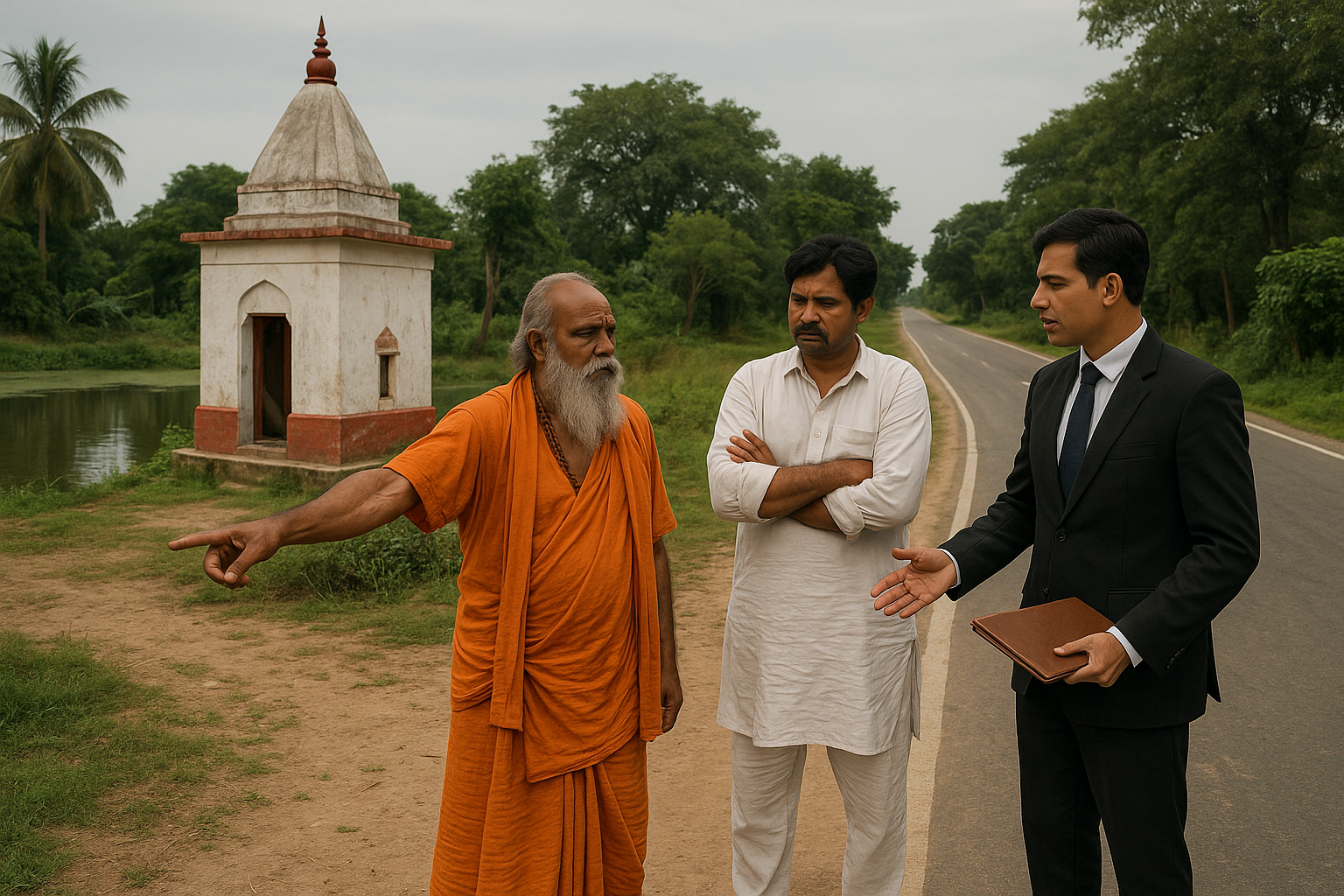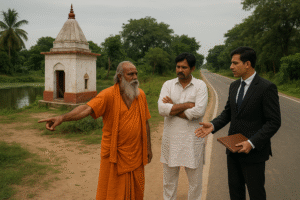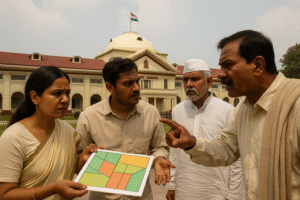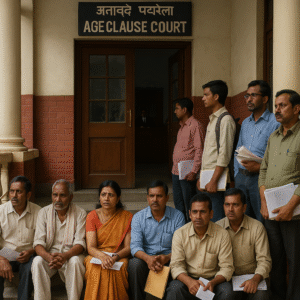Simplified Explanation of the Judgment
The Patna High Court, in its judgment dated 7 November 2022, examined a dispute involving a Math (religious institution) in Siwan district, whose land had allegedly been used by the government for constructing a public road. The appeal was filed by a Mahanth (head priest) of the Math who claimed that the road was built over the Math’s property without its consent, and sought compensation or restitution.
The Division Bench, comprising Hon’ble Mr. Justice Ashutosh Kumar and Hon’ble Mr. Justice Nawneet Kumar Pandey, dismissed the appeal, observing that the ownership of the land itself was still under litigation and that the claim for compensation had been raised after a long delay.
Background of the Case
The appellant, a Mahanth of a Math in Siwan, alleged that a pucca road was constructed over a large area of land surrounding a pond belonging to his Math. The land was being used by the public, and according to the appellant, the government authorities had built the road without seeking the Math’s permission.
The Mahanth approached several authorities — including the Commissioner of Saran Division, the District Grievance Redressal Cell, and the Public Grievance Department — to complain about the encroachment. The Commissioner had earlier directed the local Circle Officer to verify whether the road had been constructed over Math land and whether any consent had been obtained. However, that inquiry was never completed.
Frustrated by official inaction, the appellant filed a writ petition (C.W.J.C. No. 12003 of 2019) before the Patna High Court. He sought a direction for the authorities to implement the Commissioner’s order and to determine whether the Math was entitled to compensation for the land used.
Findings of the Single Judge
The learned Single Judge found that:
- The ownership of the disputed land was not clear — it was the subject of Title Suit No. 243 of 1987, in which the predecessor (Guru) of the present Mahanth had claimed the land as Math property. However, the trial court held that the land belonged to the Bihar State Board of Religious Trusts, not to the Math.
- An appeal against that judgment was still pending in the appellate court.
- The public road in question had been constructed about 17–18 years ago, and there was no record of any objection from the Math or its representatives at the time of construction.
Given these facts, the Single Judge dismissed the writ petition, reasoning that:
- The land’s ownership was disputed and sub judice.
- There was no evidence of objection at the time of road construction.
- The road had been used by the public for many years, implying either consent or acquiescence.
Arguments Before the Division Bench
For the Appellant:
Senior Advocate Mr. Rajendra Narain argued that the Single Judge had misdirected himself.
- The question of consent was irrelevant — the real issue was that the authorities failed to comply with the Commissioner’s order to verify ownership and obtain permission.
- The Math’s rights had been ignored, and the authorities had acted arbitrarily by using private land for public construction.
- Compensation should have been determined after a factual inquiry rather than assuming consent.
For the Respondents:
Senior Advocate Mr. Ganpati Trivedi, appearing for the Bihar State Religious Trust Board, and counsel for the State, Mr. Sanjay Prasad, opposed the appeal.
- They pointed out that the land had been judicially held to be trust property, not Math property.
- Since ownership was under appeal, no compensation could be granted.
- The construction was decades old, and no timely objection had been made.
Court’s Observations and Reasoning
The Division Bench upheld the Single Judge’s reasoning and added the following points:
- Ownership Still Uncertain:
Neither the writ petition nor the present appeal had been filed on behalf of the Math as a legal entity. Even if the pending title appeal later recognizes the Math’s ownership, the present claim was premature. - Delay of Nearly Two Decades:
The road was constructed around 20 years ago. Raising a compensation claim after such a long period was unreasonable, especially when the road had been used by the public all along. - No Evidence of Objection or Denial of Consent:
Although consent for use of religious trust land must ordinarily be written, the complete absence of any recorded objection at the time of construction weakened the Mahanth’s case. - Pending Title Litigation:
Since the question of ownership was still before the civil appellate court, the High Court considered it inappropriate to intervene at this stage. - Right to Future Remedy Preserved:
The Court observed that if the title appeal is ultimately decided in favour of the Math, the appellant may then raise a claim before the appropriate authority.
Final Decision
The Division Bench concluded that it would not interfere with the Single Judge’s decision. The Court dismissed the appeal, stating:
“We do not wish to interfere with the orders passed by the learned Single Judge. The issue has been left open for the appellant to agitate, if so advised, after the outcome of the Title Appeal.”
Accordingly, the Letters Patent Appeal (L.P.A. No. 1 of 2020) was dismissed.
Significance or Implication of the Judgment
- Clarifies Role of Religious Institutions in Property Disputes:
The judgment highlights that individual Mahanths cannot independently claim ownership or compensation for trust or Math properties unless their legal title is established. - Rule of Delay and Laches:
Courts will not entertain compensation claims arising long after public projects have been completed and used by the public. - Written Consent Required for Religious Property:
The Court recognized that consent for using such land must be written, but delay and silence over decades can amount to implied acquiescence. - Encouragement of Due Process:
Disputes involving temple or Math property must first be resolved through title adjudication before seeking compensation or restitution. - Guidance for Government Agencies:
Public authorities should ensure proper verification and written consent before using any trust or religious property for public purposes to prevent future disputes.
Legal Issues Decided and Court’s Reasoning
- Whether the Mahanth could claim compensation for land used in road construction?
❌ No, because ownership was not conclusively in his favour and the claim was delayed by nearly two decades. - Whether presumed consent can substitute written consent?
⚖️ Normally no, but in this case, prolonged inaction created a presumption that the Math had not objected. - Whether the High Court should interfere during pendency of a title appeal?
❌ No, the Court declined to intervene until ownership is judicially settled.
Judgments Referred or Relied Upon
- Findings of the Trial Court in Title Suit No. 243 of 1987 (pending appeal).
- No external citations; reasoning based on general principles of property and administrative law.
Case Title
Mahanth (Appellant) vs. State of Bihar & Others (Respondents)
Dispute regarding use of Math land for public road construction in Siwan district.
Case Number
Letters Patent Appeal No. 1 of 2020
arising from C.W.J.C. No. 12003 of 2019
Citation(s)
2023 (1) PLJR 9
Coram and Names of Judges
- Hon’ble Mr. Justice Ashutosh Kumar
- Hon’ble Mr. Justice Nawneet Kumar Pandey
Names of Advocates and Representation
- For the Appellant: Mr. Rajendra Narain, Senior Advocate; Mr. Dineshwar Prasad Singh, Advocate
- For the Respondent No. 7 (Religious Trust Board): Mr. Ganpati Trivedi, Senior Advocate
- For the State: Mr. Sanjay Prasad
Link to Judgment
MyMxIzIwMjAjMSNO-Ouiq–ak1–ylr5jg=
If you found this explanation helpful and wish to stay informed about how legal developments may affect your rights in Bihar, you may consider following Samvida Law Associates for more updates.








